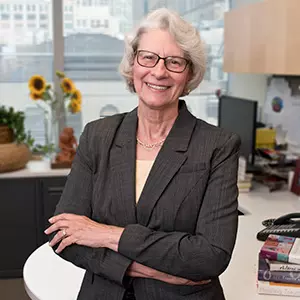
Recent Publications
Recent Presentations
Related professional experience
An expert in supporting families with infants — particularly fussy ones — Linda Gilkerson, PhD, LCSW, likes to joke that she entered the early childhood field on the day she was born.
“I was one of those fussy babies,” she says. “Then, years later, I had a fussy baby of my own.”
Her longstanding interest in babies and the earliest stages of life has driven her work to spearhead numerous initiatives throughout her career designed to support families that have recently welcomed newborns into their lives. Since joining Erikson in 1986, she has served as a professor, director of the Irving B. Harris Infant Studies Program, and executive director of the Fussy Baby Network®, Erikson’s first clinical program.
Dr. Gilkerson established Fussy Baby in 2003 as a way to help parents whose infants struggle with issues including excessive crying and difficulty sleeping or eating. Around the same time, she also developed a model for interacting with families known as the FAN (Facilitating Attuned Interactions), which is at the root of the direct service work Fussy Baby does through its home visiting and “warm line” phone service components.
“Like everything at Erikson, the FAN is theory-based,” she says. “In this case, it’s the concept of attunement in relationships. Establishing a feeling of connection helps open the door to changes that can improve families’ lives.”
Fussy Baby and the use of the FAN method have expanded since Dr. Gilkerson established them. Today, Fussy Baby has partner programs in 10 other states and two other countries, while Dr. Gilkerson travels around the country conducting training sessions for medical professionals and mental health practitioners who work with children and families, helping them understand the FAN approach and how they can incorporate it into their own work.
“Whether it’s a doctor, home visitor, youth mentor — they all say that when they understand and use the FAN method, they are calmer in stressful situations, they are more collaborative in their work, and they feel less pressure to come up with quick fixes to problems, enabling them to partner with families to come up with solutions that are more likely to work for them,” Dr. Gilkerson says.
Her work has earned her an international reputation as a leading expert on infant mental health. She has conducted FAN trainings in New Zealand and Israel, and she has served as a keynote speaker at global conferences such as the National Institute on Infant Mental Health conference in Toronto.
In 2017, the Bright Promises Foundation presented Dr. Gilkerson with its Lifetime Achievement Award for her work, noting her “pioneering contributions in promoting a focus on social-emotional developmental and reflective supervision within both the health and early intervention systems.”